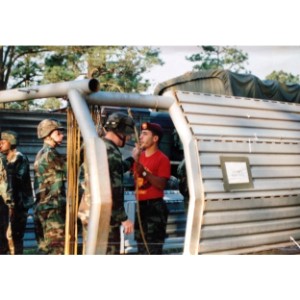
Photo: Stephen Maranian, then a Captain leads pre-jump training prior to a parachute jump at Fort Bragg (soon to be renamed Fort Liberty), NC in 1993.
There are many factors that impact an Army officer’s success and ability to rise in rank. Not surprisingly, many of the keys to success are things that occur in an officer’s first few years in the Army. Getting off on the right foot by learning and expanding one’s professional knowledge is an important factor in setting the conditions for a successful career. Getting one’s hands dirty and experiential learning are key elements of being a good leader, which in turn makes an officer effective at their job and more likely to advance. In this article we will explore the importance of hands-on experience in becoming a successful Army officer.
Becoming an Officer and Post-Commissioning Education
Becoming an officer begins with receiving a commission in the United States Army. For most this occurs through one of three major paths: graduating from the United States Military Academy (more commonly known as West Point); through the Reserve Officer’s Training Corps (ROTC) at a civilian university; or by rising through the enlisted ranks and attending Officer Candidate School (OCS). All three paths involve obtaining a bachelor’s degree which sets the conditions for the officer’s life-long learning. Following commissioning, officers attend the basic officer leadership course (BOLC) at an Army post in the United States. The location and duration of this course depend on the specific specialty, or branch, in which the officer received their commission. For example, Infantry and Armor branch officers attend BOLC at Fort Benning, Georgia; Field Artillery and Air Defense Artillery branch officers attend BOLC at Fort Sill, Oklahoma, etc. Depending on the officer’s specialty, branch, and follow-on training may last several months and includes both academic and hands-on learning which ensures that officers are tactically proficient in their specialty.
The First Duty Assignment
Doing well at BOLC is important, but upon graduation, officers move to their first duty assignment where they will really have an opportunity to make a name for themselves. School learning can only take an individual so far. Practical, hands-on experience leading soldiers in training, exercises, and in real world operations is where an officer truly cuts their teeth. There is an adage that an officer will never ask their soldiers to do something that they wouldn’t do themselves. Being an officer is not about rank and prestige, it’s about being an effective leader. Effective leaders get down in the mud with their soldiers, they climb in the engine block of tanks and howitzers to learn from their soldiers how to maintain their equipment, and in turn, they take care of soldiers in their charge. Nothing speaks to an officer’s credibility more than asking a soldier to teach them something. Never in an officer’s career will more learning occur than in their first assignment as they build their knowledge and gain experience.
Continuing to Learn in Subsequent Assignments
While the first assignment is critical, successful officers continue to learn from new experiences throughout their whole career. After 35 years of service, I still learn new things nearly every day. An officer’s success comes from many places but being a sponge for knowledge and being willing to roll up your sleeves is a common attribute in most very successful army officers’ path.
